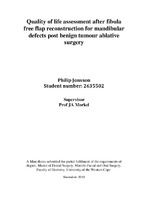Quality of life assessment after fibula free flap reconstruction for mandibular defects post benign tumour ablative surgery
Abstract
Introduction: Defects in the mandible and maxilla have various etiological factors. These include trauma, inflammatory diseases or pathology such as benign and malignant tumours. Patients that are exposed to these factors are often left with compromised function and aesthetics which could have a deleterious effects on the patients’ quality of life if not adequately restored with reconstructive surgery (Goh et al. 2008). Reconstruction should aim to allow rehabilitation of normal stomatognathic function, facial contour and aesthetics, obliteration of dead space left after ablation, and the need to examine the area for recurrence (Kim and Ghali 2011). The fibula free flap has become the gold standard for maxillofacial reconstruction. This flap offers various advantages that makes it suitable, especially for reconstructing defects of the mandible (Anne-Gaelle et al. 2011). The success of rehabilitation of these patients should however also take into consideration the patient’s ability to use a dental prosthesis (conventional or implant retained) post-operatively. This remains challenging (Kramer and Dempf 2005). The effective placement of a dental prosthesis relies on the basic principles of retention, stability and support. With the altered anatomy caused by the graft, placement of dental implants is used to enhance retention and stability. Quality of life (QoL) is a measure of a patient’s satisfaction with their current situation in regards to function and other factors compared to a perceived or expected ideal. The subjective component linked to quality of life means that it could vary from one locality to another, and therefore gathering data that will establish a baseline for these patients that have undergone tumour ablative surgeries. This could be invaluable to healthcare practitioners that operate in this specific field.

